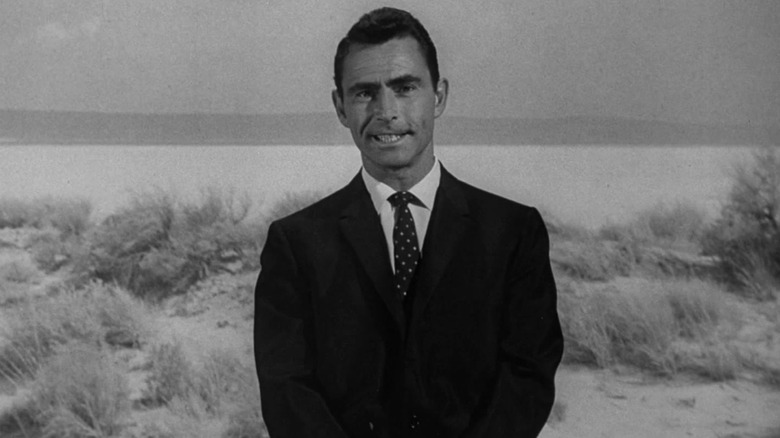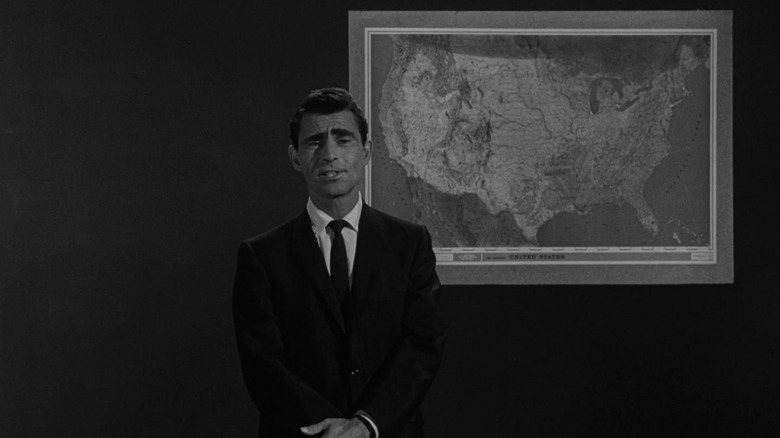Why Rod Serling hated being the narrator of The Twilight Zone.
Every single episode of the 1959 speculative anthology series The Twilight Zone was presented by series creator and head writer Rod Serling. During the first season of the show, Serling simply did the voice-over narration, but starting with the second season, he also appeared on screen, always in a nice suit and often smoking a cigarette.
Serling, it turns out, never wanted to be the narrator in The Twilight Zone. As previously reported /FilmOrson Welles was to be hired to narrate the show. Of course, Welles had a prolific radio career in the 1930s, about a decade before he made the leap to film, so his clear, sonorous voice was well rehearsed. CBS wanted Welles not only because of his fame, but also because his presence would draw comparisons to the successful 1955 CBS anthology series Alfred Hitchcock Presents. This series featured Hitchcock himself on screen, so it makes sense that another movie legend should introduce The Twilight Zone (even if Welles had nothing to do with the production of The Twilight Zone).
Of course, in order to hire Welles, CBS would have had to shell out a good salary for the director, and they simply couldn’t afford that. CBS then switched to a new narrator, a named actor Westbrook Van Voorheeswho actually narrated the opening segments for the original Twilight Zone pilot, “Where Is Everybody?” Van Voorhees was best known at the time for narrating newsreels and documentaries, so his voice would have been comforting to viewers.
The producers of “The Twilight Zone”, however, felt that Van Voorhees sounded too pompous. With production time running out, Serling was forced to step in at the last minute. CBS thought that was fine since they wouldn’t have to sign new contracts.
Serling hated it. He confirmed this in a 1963 interview with the Sacramento Bee, conveniently transcribed by MeTV.
Rod Serling had to step in at the last minute … and he hated it
One of Serling’s main problems with the screen came down to simple arrogance; he hated the way he looked. He was acutely aware of his physique and height. His wife also did little to calm his nerves. Serling said:
“My wife says that I come on the TV screen looking like a constipated fighter. (…) This is because there is nothing on camera to compare me to. But here I am, five feet five inches of solid cartilage. I really don’t like hosting.
By the way, Serling competed as a bantamweight boxer in the 1940s when he was training to become a paratrooper. He was even known for his “berserker” fighting style. It seems that he was looking at his own body as a boxer’s body … and was unsure of what he saw. He also felt uncomfortable with acting; he preferred to write and produce, hoping to hand over acting duties to a succession of notables. Serling admitted that appearing in front of the cameras gave him a nervous breakdown. He continued his martial metaphors by saying:
“I just get really nervous before going in front of the cameras. (…) If I had to go live, of course, I would never do it. It’s like boxing, I’m the only fighter in history who had to be carried both in and out of the ring.”
Serling also admitted in the same interview that fame was fleeting. He had a hit show on his hands with The Twilight Zone, but there was every reason to believe that he would be forgotten by the following year. That he was fine; he loved anonymity. However, Serling, who died in 1975, could not have predicted the lasting impact his show would have on culture at large, or how well it would be remembered.
“The Twilight Zone” was renewed in 1985, 2002 and 2019.and is revised to this day.










